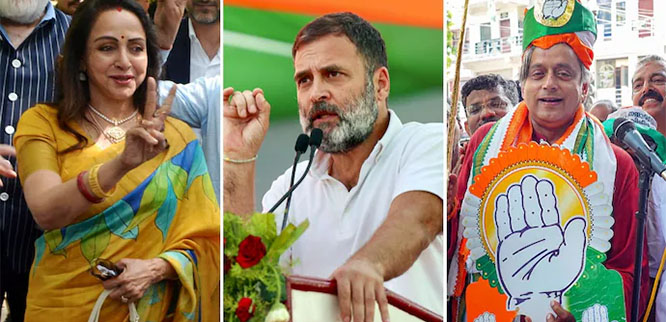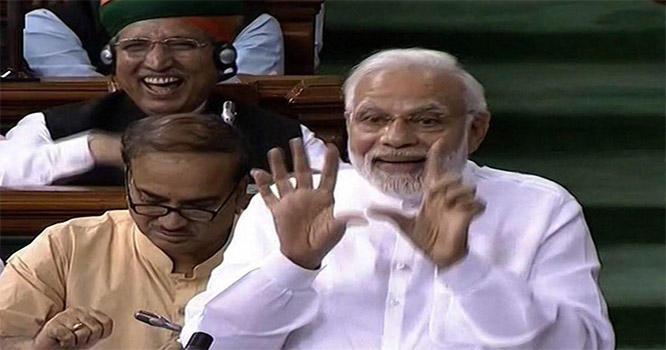New Delhi, Aug 13: The situation in Jammu and Kashmir is "very sensitive" and reasonable time should be given to the government to ensure normalcy there, the apex court said on Tuesday while refusing to pass any immediate order to the Centre to lift restrictions in the region imposed after abrogation of Article 370.
The apex court also said that it is to be ensured that no life was lost there and posted the matter after two weeks, saying it will wait for normalcy to return.
A three judge bench headed by Justice Arun Mishra was hearing the petition filed by Congress activist Tehseen Poonawalla on the Centre's decision to impose restrictions and "other regressive measures" in Jammu and Kashmir following the revocation of the provisions of Article 370.
The Centre told the bench that they are reviewing the situation in the region on a day-to-day basis and reports come from respective district magistrates and relaxations are being ordered accordingly.
"We have to ensure that law and order situation in Jammu and Kashmir is maintained," Attorney General K K Venugopal told the bench.
He referred to the July 2016 agitation in Kashmir after encounter of terrorist Burhan Wani and said it took around three months to bring normalcy at that time.
He said that since 1990, 44,000 people have been killed by extremists and people from across the border have been guiding and giving instructions to them.
He said in the present situation, it will take few days to restore normalcy in Jammu and Kashmir.
Venugopal said that not a single death has been reported since last Monday after the restrictions were imposed.
The AG was responding to the bench which asked about the steps taken by the authorities for bringing normalcy and restoring basic facilities in the region.
During the hearing, the bench said: "The situation is such that nobody knows what exactly is happening there. Some time should be given for bringing normalcy. They are analysing the situation on a day-to-day basis.
"The government's endeavour is to restore normalcy. That is why they are reviewing the situation on a day-to-to basis. If tomorrow anything happens in Jammu and Kashmir, who will be responsible? Obviously the Centre."
The bench further said that it has to look into all the pros and cons and therefore reasonable time should be given to the government to ensure normalcy returns in the state.
It asked the petitioner's counsel senior advocate Menaka Guruswamy to give specific instances where relief is needed.
"You give us specific instances and we will give directions to them to provide relief," the bench said.
The top court asked the AG as to how much time will be needed to restore normalcy.
Venugopal replied that there is need to ensure that law and order situation is maintained and least inconvenience is caused to the general public.
He said that large number of troops and para military forces have been sent to Jammu and Kashmir.
While Guruswamy was making submissions that due to snapping of all type of communication people failed to speak on the festive occasion, the bench said, "nothing can be done overnight. There are serious issues. Normalcy would return and we expect it will come with time. What is important is it has to be ensured that no life is lost".
Venugopal said that the government is ensuring that no violence or human rights violations takes place there.
He said that during the agitation in July 2016, total of 47 persons had died but till today no one has died.
Before posting the matter after two weeks the bench said, "We are with you on the issue of right to liberty of the people. But we should have a real picture before us.
"Wait for sometime. Let us wait for normalcy to return."
The bench told further the petitioner that he will have the chance to come back after two weeks.
At the outset, Guruswamy said how can there be total prohibition on communication that even soldiers posted in the state cannot talk to their family members.
This submission invited angry reactions from the bench.
It said: "Why you are raising grievances on behalf of soldiers. Your prayer is not this. Soldiers have to maintain discipline and if they have any grievance then let them come before us. Why you are taking up the cause of soldiers."
When Guruswamy tried to make a reference of Article 370, the bench warned her saying, "Don't make any such statement on it".
She had said she was not making any comment on Article 370 but was on the issue of constitutional right of the individuals.
While she was making submissions on various violation of rights by referring to people's difficulty in even reaching to hospital and schools and police station, the bench said that in the petition no instances have been cited like that.
"Your petition is poorly drafted," the bench said, adding that it is also filed very carelessly without realizing the seriousness and importance of the matter.








Comments
Very shortly rss finance group ambani n addani will release money to their sewak to purchase land at J&K.then they will put barricade like Palestine.
Wait see iranian shah drama. But our mouna modified will never say any thing about these.
Add new comment